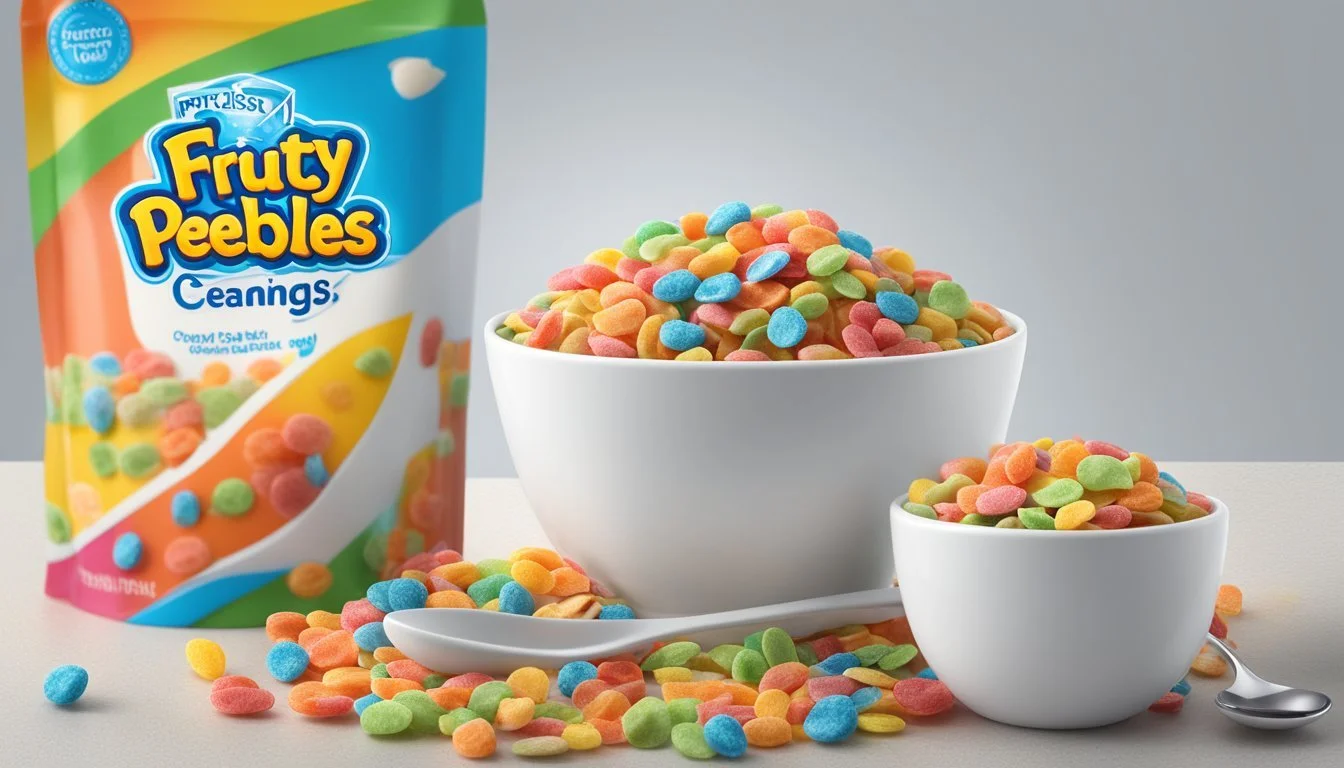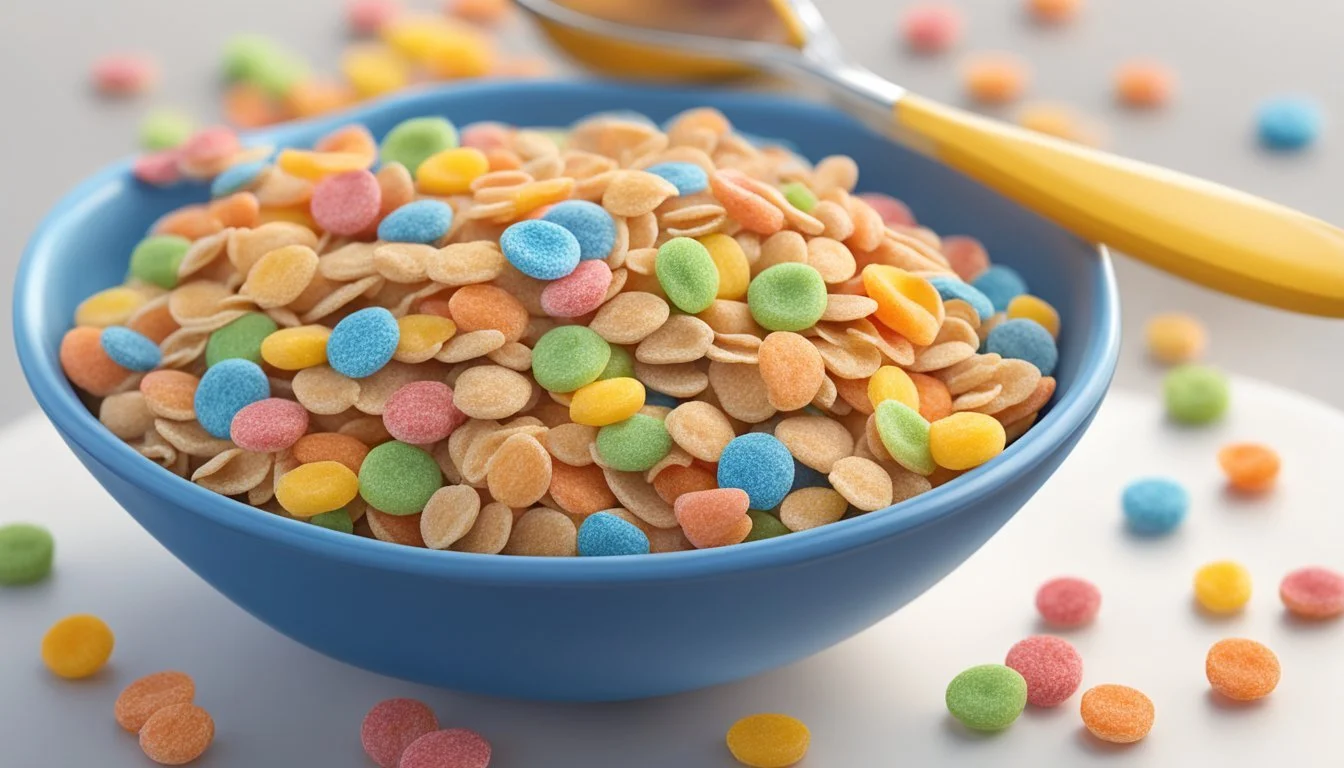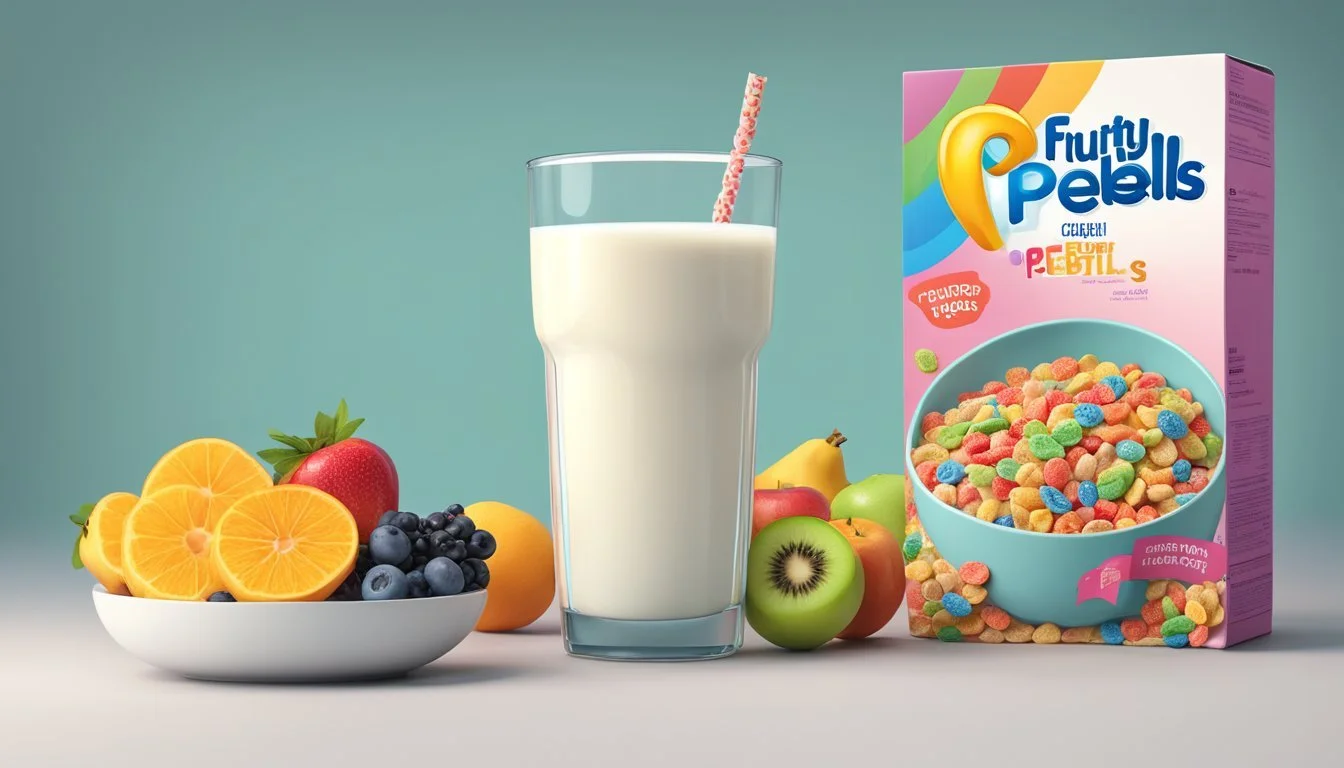Fruity Pebbles Nutrition Facts & More
A Balanced Look at this Colorful Cereal
Fruity Pebbles, a beloved breakfast cereal, has been gracing breakfast tables for over 50 years. This colorful, crispy rice cereal boasts an intense fruity flavor that appeals to both children and adults alike. While it's known for its sweet taste, many wonder about its nutritional profile.
A 3/4 cup serving of Fruity Pebbles contains approximately 108 calories, with 87% coming from carbohydrates, 9% from fat, and 4% from protein. The cereal provides some essential vitamins, including vitamin A, B6, and B12. However, it's important to note that Fruity Pebbles is relatively high in sugar, with about 12 grams per serving.
When considering Fruity Pebbles as part of a balanced diet, portion control is key. While the cereal can be enjoyed as an occasional treat, it's not typically recommended as a daily breakfast option due to its high sugar content and limited fiber. Understanding the nutritional content of this popular cereal can help consumers make informed decisions about their breakfast choices.
Nutritional Profile Overview
Fruity Pebbles cereal provides a mix of macronutrients and micronutrients, with carbohydrates as the primary component. It contains added vitamins and minerals but is relatively high in sugar.
Calories and Macronutrient Breakdown
A 3/4 cup serving of Fruity Pebbles contains approximately 110-140 calories. The macronutrient breakdown is:
Carbohydrates: 86-88%
Fat: 8-9%
Protein: 4-5%
The cereal is low in fat, with only 1.4-1.5 grams per serving. It contains 31 grams of total carbohydrates, including 12 grams of sugar. Protein content is minimal at 1 gram per serving.
Fiber content is negligible, with 0 grams listed. This results in the net carbs being nearly equal to the total carbs.
Vitamins and Mineral Content
Fruity Pebbles is fortified with several vitamins and minerals:
Vitamin A: 25-37% of Daily Value
Vitamin B6: 58% of Daily Value
Vitamin B12: 93% of Daily Value
Other micronutrients are present but in smaller amounts. The cereal provides trace amounts of iron and calcium.
While Fruity Pebbles offers some nutritional benefits through added vitamins, its high sugar content and lack of fiber are notable considerations. The cereal's bright colors come from artificial food dyes like Red 40, Yellow 6, Yellow 5, and Blue 1.
Detailed Nutrition Facts
Fruity Pebbles cereal contains a mix of carbohydrates, sugars, and small amounts of fats and protein. It also provides several vitamins and minerals through fortification. Let's examine the specific nutritional components in more detail.
Carbohydrates and Sugars
Fruity Pebbles is primarily composed of carbohydrates. A 3/4 cup (36g) serving contains 31g of total carbohydrates, which accounts for about 88% of its caloric content. Of these carbohydrates, 12g are sugars.
The main ingredients contributing to the carbohydrate content are:
Rice
Sugar
The cereal does not contain any dietary fiber. The high sugar content comes from added sugars rather than natural sources, contributing to its sweet taste and appeal to children.
Fats Profile
Fruity Pebbles has a relatively low fat content. A single serving contains 1.4g of total fat, which is about 2% of the daily value based on a 2000-calorie diet.
Breakdown of fats:
Saturated fat: 1.3g
Trans fat: 0g
Polyunsaturated fat: 0g
Monounsaturated fat: 0.1g
The cereal contains small amounts of canola and/or soybean oil, which contribute to its fat content. The low fat content helps keep the overall calorie count lower compared to some other breakfast cereals.
Protein Content
Fruity Pebbles provides minimal protein. A single serving contains only 1g of protein, which is a small fraction of the daily recommended intake for most individuals.
The low protein content is due to the cereal's primary ingredients being rice and sugar, neither of which are significant sources of protein. For a more balanced breakfast, consumers may need to pair Fruity Pebbles with protein-rich foods like milk, yogurt, or eggs.
Key Vitamins and Minerals
Despite its high sugar content, Fruity Pebbles is fortified with several essential vitamins and minerals:
Vitamin C
Vitamin B6
Vitamin B12
Folic Acid
Iron
Zinc
The exact amounts of these nutrients are not provided in the search results. However, many breakfast cereals are fortified to provide a significant percentage of the daily recommended values for these nutrients.
It's important to note that while these added nutrients can contribute to daily intake, they don't negate the high sugar content and low fiber of the cereal. Consumers should consider these factors when deciding how Fruity Pebbles fits into their overall diet.
Health Impact
Fruity Pebbles' nutritional profile presents a mix of beneficial nutrients and potential health concerns. The cereal's fortification adds essential vitamins and minerals, but its high sugar content and lack of fiber raise important dietary considerations.
Dietary Considerations
Fruity Pebbles are low in fat and calories, with about 140 calories per serving. This makes them a potential option for those watching their calorie intake. However, the cereal is high in sugar, containing 12 grams per serving.
Sugar consumption should be moderated, as excess intake can lead to weight gain and other health issues. The cereal lacks dietary fiber, providing 0 grams per serving. Fiber is crucial for digestive health and feeling full.
Beneficial Nutrients
Fruity Pebbles are fortified with several essential vitamins and minerals. A single serving provides significant amounts of iron, zinc, and B-vitamins. These nutrients support various bodily functions.
Iron is vital for oxygen transport in the blood. Zinc supports immune function and wound healing. B-vitamins aid in energy metabolism. The cereal also contains vitamin D3, crucial for bone health and immune function.
Vitamin A and vitamin C are present in notable amounts. These antioxidants support eye health and immune function respectively.
Concerns and Moderation
Despite its nutrient fortification, Fruity Pebbles raise some health concerns. The high sugar content is a primary issue. Excessive sugar intake can contribute to obesity, tooth decay, and chronic diseases.
The cereal's lack of fiber is another drawback. Fiber aids digestion, promotes feelings of fullness, and helps maintain healthy blood sugar levels. The low protein content (1g per serving) may not contribute significantly to daily protein needs.
Sodium content should be considered. While not excessively high, it contributes to daily sodium intake, which should be monitored for heart health. Moderation is key when consuming Fruity Pebbles as part of a balanced diet.
Comparative Analysis
Fruity Pebbles' nutritional profile differs from other cereals and its own brand varieties. Understanding these differences helps consumers make informed choices about their breakfast options.
Compared to Other Cereals
Fruity Pebbles contains 120 calories per 30g serving, which is comparable to many other sweetened cereals. Its sugar content of 12g per serving is higher than some alternatives, placing it in the category of sugary cereals.
The cereal provides minimal fiber at less than 1g per serving. This is lower than whole grain or bran-based cereals, which often offer 3-5g of fiber per serving.
Fruity Pebbles is fortified with vitamins and minerals. It provides 10% of the daily value for several B vitamins and iron per serving. However, many other cereals offer similar or higher levels of fortification.
Protein content in Fruity Pebbles is low at 1g per serving. This is less than cereals made with whole grains or those containing nuts, which can provide 3-5g of protein per serving.
Within Brand Varieties
Post offers several variations of Pebbles cereals, each with slight nutritional differences. Cocoa Pebbles has a similar calorie and sugar content to Fruity Pebbles, but with a chocolate flavor.
Marshmallow Fruity Pebbles contains more sugar, typically 13-14g per serving. This increase is due to the added marshmallows.
Pebbles Cereal Treats, a snack bar version, has a denser calorie profile. It often contains around 150-170 calories per bar, with higher fat content due to added oils.
Some limited edition flavors may have slight variations in sugar or artificial coloring content. However, the base nutritional profile typically remains similar to the original Fruity Pebbles.
Recommended Intake
Determining appropriate serving sizes and integrating Fruity Pebbles into a balanced diet requires careful consideration. Portion control and nutritional balance are key factors to keep in mind.
Portion Sizes
A standard serving size of Fruity Pebbles is 3/4 cup (27 grams). This portion contains approximately 110 calories. It's important to measure servings accurately to avoid overconsumption.
For children, smaller portions of 1/2 cup may be more appropriate. Adults should generally limit intake to one serving per day, if consumed regularly.
The cereal box often includes a measuring guide to help with portioning. Using this tool can prevent unintended overeating.
Balancing with Diet
Fruity Pebbles should be consumed as part of a varied diet. The cereal is low in protein and fiber but high in added sugars. It's crucial to balance it with nutrient-dense foods.
Pairing Fruity Pebbles with milk adds protein and calcium. Adding fresh fruits increases fiber and vitamin content. This combination helps create a more nutritionally complete meal.
The cereal provides 15% of the daily value for Vitamin A (750 IU per serving). However, it lacks significant amounts of other essential nutrients like potassium.
To maintain a balanced diet, limit Fruity Pebbles to occasional consumption. Focus on whole grains, fruits, vegetables, and lean proteins for most meals and snacks.
Added Nutrients
Fruity Pebbles cereal is fortified with various vitamins and minerals to enhance its nutritional profile. These added nutrients aim to provide essential micronutrients that may be lacking in many diets.
Fortification Details
Fruity Pebbles contains a blend of added vitamins and minerals. The cereal is fortified with iron, an important mineral for oxygen transport in the body. It also includes B-complex vitamins such as thiamin (B1), riboflavin (B2), niacin (B3), and vitamin B6. These B vitamins play crucial roles in energy metabolism and nervous system function.
Vitamin D is another key addition, supporting calcium absorption and bone health. Folic acid, a synthetic form of folate, is included to support cell growth and development. The cereal also contains added zinc, which is essential for immune function and wound healing.
Trace Nutrients
In addition to major fortifications, Fruity Pebbles includes several trace nutrients. Vitamin A is added to support vision and immune function. The cereal contains small amounts of calcium for bone health, though not in significant quantities. Phosphorus, another mineral important for bone structure, is present in trace amounts.
Some batches may include added vitamin E as an antioxidant. Magnesium and copper are also found in small quantities, contributing to various bodily functions. While these trace nutrients are present, their amounts are generally low compared to daily recommended values.
Understanding Labels
Nutrition labels and ingredient lists provide crucial information about Fruity Pebbles' nutritional content and composition. Decoding these labels helps consumers make informed decisions about their cereal choices.
Decoding Nutrition Labels
Nutrition Facts panels on Fruity Pebbles boxes display key nutritional information per serving. A typical 36g serving (about 3/4 cup) contains 140 calories. The label lists total fat, saturated fat, cholesterol, sodium, total carbohydrates, dietary fiber, sugars, and protein.
Daily Value (DV) percentages show how much a nutrient contributes to a 2,000-calorie diet. For Fruity Pebbles, total carbohydrates make up 10% of the DV, while sugars account for 12g per serving.
The label also includes essential vitamins and minerals. Fruity Pebbles are often fortified with iron, vitamin D, and B vitamins to boost their nutritional profile.
Ingredients List
Fruity Pebbles' ingredients are listed in descending order by weight. The main ingredients are rice, sugar, and vegetable oil. Other components include:
Salt
Natural and artificial flavors
Food coloring (Red 40, Yellow 6, Yellow 5, Blue 1)
Turmeric oleoresin for color
BHT and BHA as preservatives
The ingredient list reveals that Fruity Pebbles contain no fruit, despite their name and flavor. The cereal's fruity taste comes from artificial flavorings, while its vibrant colors are derived from synthetic dyes.









